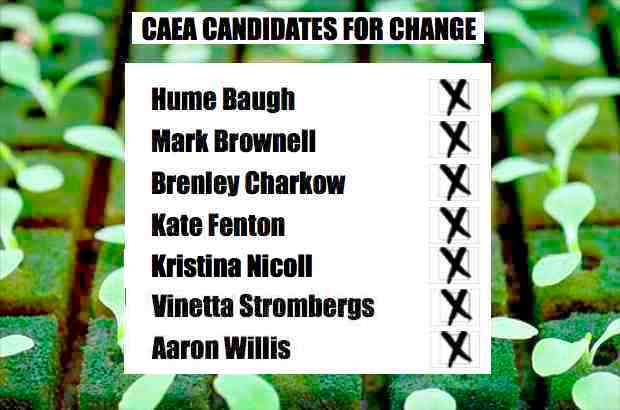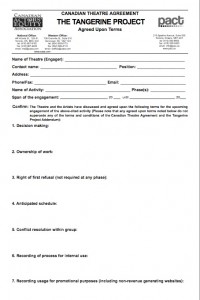What the new Indie should look like
by Aislinn Rose
Last week I wrote about the CAEA elections and introduced you to the seven Ontario candidates running as a slate with three main areas of concern:
- A new Indie Agreement that reflects the will of the membership
- Drastically improved communication between staff, council and the membership
- A re-examination of the role Equity plays within the performing arts ecology
This week I want to focus on the first item of their collective agenda:
A new Indie Agreement that reflects the will of the membership.
This is an important distinction to make: an agreement “that reflects the will of the membership”. For years now, Equity and a good number of its members have been at odds when it came to how independent theatre ought to be made in this country. These two articles offer quite a bit of history on this issue, including the votes by members to demand a new agreement, and the creation of the Independent Theatre Review Committee.
The ITRC conducted a nation-wide survey of Equity members, which resulted in an excellent final report, summarizing the responses from artists and engagers alike, and offering several key recommendations. When it comes to “the will of the membership”, that information is readily available, and I applaud the ITRC for their efforts in compiling the data.
Below I offer you my own recommendations of what the new Indie policy should look like, and exactly how that policy addresses all of the major recommendations put forward by the ITRC. I have also used the information in that report to argue for the death of the Co-Op agreement. These are my personal views based on my understanding of the final report and my work as an independent theatre producer working with many Equity members and several staff members over the past few years.
This is what the new Indie should look like:
1) The new Festival Policy should be put forward as the new small-scale theatre contract. You can see the current festival policy at the bottom of the post.
I recommend not calling it an agreement, as there is currently no bargaining organization that exists in the way that PACT bargains on behalf of its companies for the CTA.
2) An “agreed upon terms” document, similar to the one included in the Tangerine Project, should be included as an addendum, allowing artists to bargain on a per-project basis, key terms including project ownership, first right of refusal, etc. An additional section could be added regarding agreed-upon fees, where artists & engagers opt for either a share of profits, or a set minimum fee, as determined by the group. Again, this would be on a project-by-project basis.
Let me be clear: the only role Equity would play in the creation of this document would be to ensure it has been filled out and that all participating members have signed off. At that point, it goes into a file.
3) Finally, a jury of peers (mostly members, with some non-member engagers) should be created (perhaps via the new CAEA Indie Advisory Committee) to assess contracts that may bleed into the harder to determine engager category.
There were some contradictions within the survey results regarding which engagers should be allowed to use the new Indie, based on project budget, and or a company’s core funding. Such a committee of peers could assess these situations should they arise. It is essential that the committee be made up of peers as those peers are actively working in the community and have the best sense of who these companies are and what their resources might be.
Notes on how this policy addresses the ITRC’s Overall Conclusions and Major Recommendations:
ITRC Conclusion #1: The survey revealed that of the small-scale agreements, only the Festival Policy is well liked by members, engagers and staff. That is telling. The main recommendation in this section was that the current agreements should be replaced with a new agreement(s). It is my assertion that this version of the Indie could replace all of these agreements, providing artists and engagers with a high level of flexibility allowing for a variety of creation methods and company models.
ITRC Conclusion #2: Members and engagers highly value small-scale theatre, and this view is also supported by comments from staff. This version of the Indie would confirm and validate the importance of this work, by recognizing the financial challenges that companies & collectives inevitably encounter. It would confirm that Equity does not consider artists who engage themselves in this kind of work as “hobbyists”.
ITRC Conclusion #3: The majority of dissatisfaction appears to stem from concerns about lack of flexibility, administrative red tape, and adversarial relationships with staff. Many members feel the need to lie to CAEA or do their work in the shadows. Staff are concerned with the amount of work required to administer the current agreements. This one seems obvious. The Festival Policy is the most popular agreement among both artists and staff. It offers an incredible amount of flexibility and essentially only requires filing on behalf of Equity staff. The addition of the Agreed-Upon Terms ensures a more professional level of engagement in that the terms are created while working toward a future for that individual project. This kind of agreement would likely improve satisfaction levels with Equity’s role in small-scale theatre, which is currently quite low.
ITRC Conclusion #4: Members & engagers agree artists should have safe working conditions, and an adherence to Equity’s standards of professional conduct. The protections members were most willing to waive included the quotas of Equity vs. non-Equity members, how artists are paid (cheque, money order, etc.), and pay for for a full work week regardless of the level of particupation. The use of the Festival Policy and Agreed-Upon Terms offers the security of safe working conditions by ensuring that artists are insured while working. While insurance costs may be somewhat burdensome for companies and co-ops, I believe those costs are minor in comparison to alternatives offered in current agreements, and really, who doesn’t like to be insured?
The Agreed-Upon Terms document then allows the collective of artists/engagers to decide amongst themselves how artists will be paid, the periods of engagement, etc.
According to the survey, members and engagers were very much in line with one another regarding which protections & benefits were most important, and which were less important, which indicates that members & engagers are capable of coming to agreed upon terms amongst themselves.
ITRC Conclusion #5: Members & engagers value flexible terms of engagement in small-scale theatre work. While members value compensation for their work, the survey indicated a strong willingness to take part in projects where fees are paid as profit-shares, or percentage of gross revenue. Members & engagers were in STRONG AGREEMENT that profit-sharing models are acceptable in lieu of minimum fees, including equal splits or profit-sharing where participants receive multiple shares for multiple jobs on a project.
As I’ve suggested above, compensation should be spelled out very clearly within the Agreed-Upon Terms addendum in order to address options of equal splits, profit share, and/or multiple shares for multiple roles. Again, this allows members and engagers to determine these factors amongst themselves without Equity interference.
ITRC Conclusion #6: Most respondents were in agreement that non-profits and ad-hoc groups should have access to the new Indie. While I think the vast majority of companies and ad-hocs wishing to use the new indie would be clear-cut in terms of their eligibility, the CAEA Indie Advisory Committee (as mentioned above) could be of assistance in determining eligibility with projects in the grey zone: projects with budgets over $50K, as were noted in the survey.
Members & engagers regarding both also felt there shouldn’t be any restrictions based on past productions or other agreements used, and that the engager can be a member or a non-member. This is significant considering most current small-scale agreements include restrictions on the number of times a company can use them, or include a “ladder” system wherein a company that has used one agreement can no longer access another, etc.
Final Note:
The process should not be seen as an “application” for permission to Equity. Members and engagers need only follow the guidelines set out in the Policy, including their own agreed-upon terms, submit the required paperwork to Equity, and then get on to the task of making theatre.
In turn, Equity staff would receive the paperwork, ensure it has been sign-off by all members involved, receive the appropriate payments for insurance, and file the paperwork accordingly, allowing artists to get on to the task of making theatre.
Stay tuned for the conclusion to this post later this week: Why the Equity Co-Op should just die
Follow Aislinn on twitter: @AislinnTO





Thank you again Aislinn.
Dear God it all seems so straight forward! The Festival Policy and subsequent Agreed Upon Terms Addendum; CAEA Indie Advisory helping determine projects that are a bit more nebulous; no need for an application for Permission. As someone who has been both a member and engager PROFESSIONAL (never a hobbyist), thank you for dispelling a lot of what makes up these current agreements while proving that what you’ve highlighted above respects the common interests of both members and staff.
Great post Aislinn.
Love that you have managed to post both documents that could be combined to create this indie contract so policy wonks can see exactly what you are proposing. It is very specific and easy to understand, while maintaining the flexibility the creative process demands..
You also make a good case for why these changes reflect the will of membership as discovered by CAEA through their own survey on the topic. I like the idea of a joint committee made up of the indie community and CAEA reps to talk about potential situations that could abuse the process and vet them. Everyone in this conversation wants artists to be paid appropriately to the resources available and it would be nice to work together on that.
There are excellent ideas expressed in this post, Aislinn. I would like to follow up with a few thoughts of my own regarding what is at stake for Equity here with the release of these new agreements. You will note that I don’t mention what is at stake for the small-scale indie community. I believe there is *nothing* at stake for our community. Our community does not really need Equity anymore. It’s doing just fine on its own – one of the few sectors left in our art form that is actually quite vibrant, thank you very much. It is Equity who desperately needs the indie community these days. Not the other way around. I think there are a lot of Equity members waking up to that fact right about now.
I note that you use the Tangerine agreement as a template for this. Up until very recently we’ve heard that the Executive Director will be using a “Tangerine-like” model. I actually don’t think the Tangerine would be a very good model for our community and I’ve given lots of reasons why on the equity fb site. My primary objection is that it has PACT’s fingerprints all over it. I am perfectly fine with PACT and Equity using it under the CTA however.
Just a few weeks ago the message coming from Equity about a “tangerine-like” indie appeared to shift. (I’d like to think it was because of my objections – but I think this was already in the works.) Speculation is that we will, instead, be seeing a roll-out of Co-op/Indie 2.0. I can hear the groans of many in our community if this is the case because there are pitfalls with this new course as well – simply rehashing the old agreements.
Thanks for your comments everyone, I really appreciate the feedback.
Mark, you mention that I use the Tangerine as a template, but I would disagree. I would say the main template behind this document is the Festival Policy, the most widely appreciate policy among members, engagers AND staff… that is what’s at the core of this proposal.
I’ve used only a single page from the Tangerine as a useful document that could be included as an addendum, which would be attached to a signed Festival Policy-like Indie. These terms & conditions would be negotiated amongst the members of the project and signed off by all participants. Equity would simply keep a copy on file.
As I’ve mentioned in previous comment threads on our indie posts, I am completely opposed to any new Indie that is modeled after PACT’s Tangerine Project. My reasoning essentially is this:
While I’m a fan of the Tangerine Contract (we used it for phases 2 & 4 of Jesus Chrysler), it really doesn’t address the needs of small-scale work by indie artists. It is my understanding that Tangerine was designed for small to mid-sized PACT organizations to encourage them to actually invest in the development of projects from the early stages, rather than simply buying up the works that have already been created on the backs of tiny indie organizations.
While its provisions do allow for greater flexibility in terms of payment structure and rehearsal schedules, to use the Tangerine Contract, companies would still need to be able to afford the minimum hourly rate for every hour worked, and those kinds of resources are very often not available.
The survey clearly revealed (as was noted significantly in the ITRC final report), members are willing to waive minimums in order to work on projects they deem important for other reasons. For Equity to insist on these minimums will be a clear reflection of an organization that just wants to say “we know best” to its members who believe otherwise.
Thanks for the clarification, Aislinn. If we are to believe the public statements of the Executive Director then the results of the ITRC survey will be taken into account in this reboot. But I’m not hearing much difference in the ED’s position on one key point: mandatory minimums. Her opinion on that hasn’t budged in FIVE YEARS and she now points to the member’s survey results to back it up. I believe there are a couple of flaws in that argument given the data. The first is what Kris Joseph aptly described as the “Do you think murder is bad?” survey question. What are we likely to answer to that? If I read the question: “Would you like to receive $1000/week mandatory minimum salary for a fringe show?” I’m pushing the button marked “HELLA YES!” along with everyone else. It is not a very accurate/honest answer – but it can be used as a justification for ramming through mandatory minimums regardless. The second flaw in this argument is that there is a grave danger of cherry picking survey results to suit a specific position. We saw that with the previous member’s general survey, I believe. It was used to justify Equity’s past inaction even though the questions were not necessarily indie specific. I will give you an example from this current survey as well: The one major point that has been missed in Equity’s calculation (at least in recent public discussion) is the “member dissatisfaction with existing agreements” part. The indie scores particularly low in this regard – that’s core data – and yet we may be looking at an indie 2.0 that in no way addresses that dissatisfaction because it would still contain forced and pricey mandatory minimums. Old wine. New bottle. Massive fail.
[…] is a continuation from Tuesday’s post about what the new Indie Policy should look like, and how that policy would reflect the will of Equity members. Today I’m arguing why the […]
[…] for independent theatre artists to make their own work with more freedom and leniency please read this great article via the Praxis Theatre Website. Be Sociable, Please Share! Tweet glen matthews, griffin mcinnes, jeremy webb, jessica […]